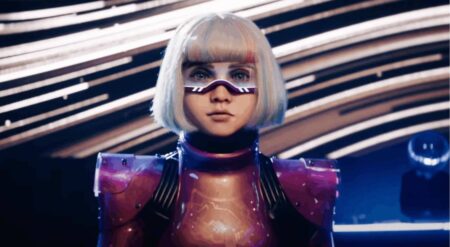Communication is key in a relationship. Without it, things can go south pretty quickly. When a relationship is built on a lack of communication, the unspoken truths build into resentment. Worse yet, trust can be torn asunder once the truth is revealed. This sounds serious and is easily dismissed. But in Joosje Duk‘s Happy Ending, this message is delivered thoughtfully through heartfelt moments and comedic touches that never downplay the real underlying issue the film’s protagonist is grappling with.
In Happy Ending, we meet Luna (Gaite Jansen) and Mink (Martijn Lakemeier). Celebrating their first anniversary, Luna conveys to the audience and her friends that she has yet to orgasm while with Mink. This is despite their active sex life. Now, a year in, she’s unhappy but doesn’t know how best to have this conversation with her partner, who, leading up to this point, believes he’s been getting her off every single time. Luna’s friends urge her to try new things in the bedroom to solve the issue. Suggesting to Mink a threesome, the two arrange an encounter with Eve (Joy Delima). One night with her opens up a whole new range of emotions and issues for the young woman.
While the concept of a threesome is titillating for anyone familiar with the sudden suggestion to have one or open up a relationship, Happy Ending points out how this suggestion indicates trouble under the surface. Duk’s writing and direction highlight to the audience from the get-go the unhappiness and awkwardness behind Luna’s actions. Never truly comfortable being herself, she traps herself in a tight corner to please her boyfriend. Ironically, it’s her desire to please through omission that spells out the future of this young coupledom.
Eve is the unfortunate bystander in the couple’s path to destruction, as she is also swept up in Luna’s inability to communicate. Finally introduced to a partner that can get her off, Luna has stars in her eyes. She sees what can be, but Eve continues to reinforce boundaries. Eve’s constant checking in on both Mink and Luna is a much-needed touch. Making sure all parties are in the know and consenting is key for communication, as well as ensuring no lines are crossed—hats off to Duk for this.

With the arrival of a “happy ending,” Luna’s decision to push her and Mink into a threesome is the key to their development. It is painful and excruciating even as Luna navigates the emotional complexities of its aftermath. Through Eve, she learns how to communicate her desires but finds herself adrift at sea. How can she talk to Mink? What will he think of her pursuing Eve? Her indecision and fear paint a tableau for the audience. What started as a simple way to spice things up and achieve an orgasm opens up a chest of uncomfortable realities she has to face. The truth will come to light no matter how much she tries to put it off.
While the storytelling and direction are key to tackling these uncomfortable relationship-related subjects, Happy Ending is full of light moments conveyed through its actors and the editing. Gaite Jansen is delightfully awkward as Luna. She’s sympathetic yet incredibly frustrating, adorable yet vexing as she struggles to flirt and communicate with her partner and gets head-over-heels in infatuation with Eve. Her struggles are relatable. Disregarding the threesome set-up, many will find Luna’s dilemma relatable. Her relatability is what allows us to sink into the scenario onscreen.
The sex we see onscreen is varied. Some moments are executed for comedy, like testing the sound levels in a room to determine if people can hear. Some are frantic, harried, and desperate, representing the overwhelming nature of first love. Others are sensual, delicious, and eye-opening, revealing something addictively seductive in the process. The sex isn’t just to shock. No, each moment tells us a bit about our characters. This becomes most clear when the inevitable threesome shows up onscreen, with the introduction of Eve and her reminding the two that it’s not just about her. This is really about Luna and Mink.
Happy Ending, while fashioned as a comedy, is also part tragedy. There’s a fine line between the two genres, after all. What comes up must come down, and boy, does Luna’s reality crash hard. But again, Duk doesn’t hide the trajectory of anything. The clues are on display for the audience to see. Throw in what the audience brings with their own previous experiences. It’s hard not to guess where things go. And, frankly, no other outcome would have felt realistic. In the outrageous, the realism leaves the most impact in Happy Ending. However, realism may be a difficult pill for audiences to swallow. It might not be the “happy ending” they were hoping for.
As a feature debut, Duk starts strong with Happy Ending. The focus on sex is the lure to bring people in, but the overwhelming message of couples needing to communicate resonates the most. Keeping things bottled up does nothing to promote growth and security in a relationship. If you’re unsatisfied, share it sooner rather than later. Eventually, these things bubble up to the surface if you don’t. And, in Happy Ending, this bubbles up explosively—collateral damage included. Come for the sex. Stay for the message all dating people need to hear.
Happy Ending is now streaming on Netflix.
Happy Ending
-
Rating - 8.5/108.5/10
TL; DR
As a feature debut, Duk starts strong with Happy Ending. The focus on sex is the lure to bring people in, but it’s the overwhelming message of couples needing to communicate that resonates the most.







